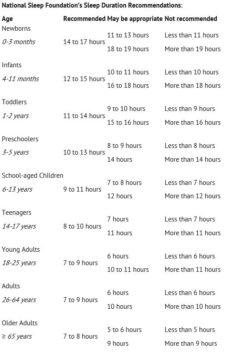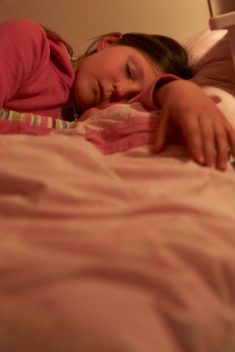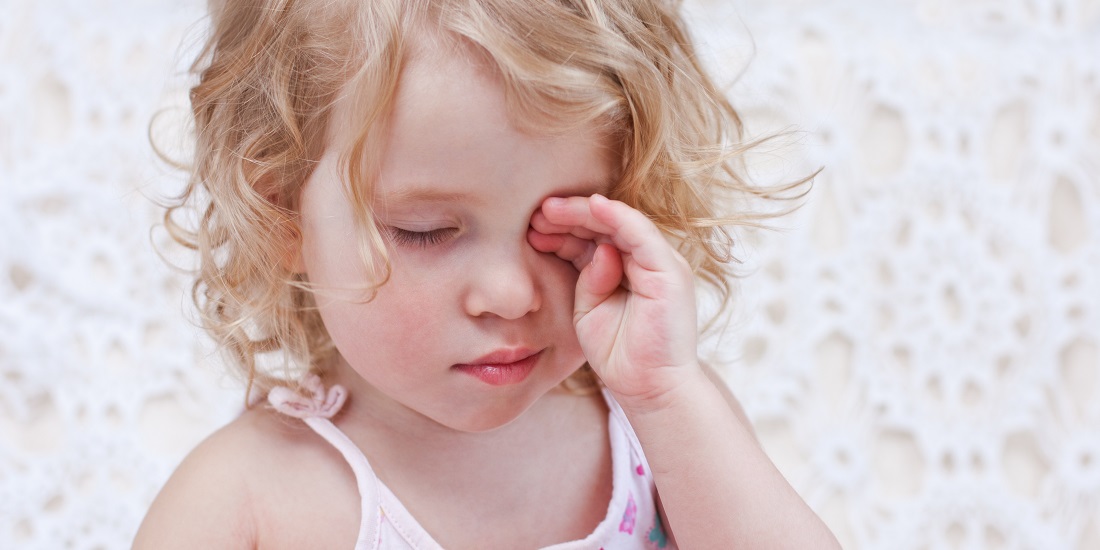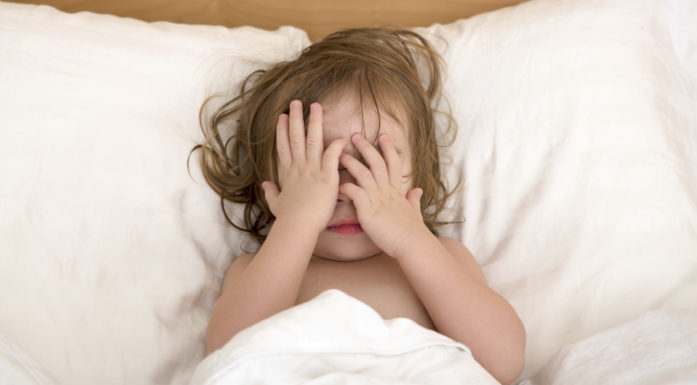Is your child getting enough sleep?
Children who get the least sleep have the greatest risk of developing mental health issues.

Recommended hours of sleep for different age groups. Click on the table to make it larger. Source: www.sleepfoundation.org/press-release/national-sleep-foundation-recommends-new-sleep-times
There are plenty of good reasons to make sure children get enough sleep, but their parents’ evening peace is nowhere near the most important one.
“If we make sure our children get enough sleep, it can help protect them from mental health problems,” says Bror M. Ranum, a fellow at NTNU’s Department of Psychology.
A study of almost 800 children followed over several years shows that those who get the fewest hours of sleep are at greatest risk of developing psychiatric difficulties later, including ADHD, anxiety and depression.
“We’re seeing an association between sleep duration and a risk of symptoms of emotional and behavioural disorders,” says Ranum, first author of a new article on children, sleep and risk of mental health disorders.
Boys who sleep fewer hours have an increased risk of developing behavioural issues. Both girls and boys who get less sleep are at greater risk for future emotional problems. The measurements do not indicate anything about the quality of sleep.
- You might also like: High screen use among children can lower emotion understanding

What is too little sleep for some childen, is enough for others. But on average the children who sleep the least are most at risk of mental problems. Photo: Colourbox
Trondheim Early Secure Study
Children’s sleep was measured with motion sensors every night for a week. The researchers conducted clinical interviews to measure mental health difficulties. These procedures were repeated several times every two years.
The study is part of the Tidlig Trygg I Trondheim project (TtiT – Trondheim Early Secure Study). This is a long-term study that has examined nearly a thousand children when they were 4, 6, 8, 10, 12 and 14 years old. The survey of 16-year-olds in the project has just started. Among the many goals of TtiT is to explore why some children develop mental health problems.
The study also investigated whether psychological difficulties might cause children to sleep less. The data do not indicate this to be the case. Sleep duration influences the risk of later problems, not the opposite.
What’s new?
“Previous studies have also shown that sleep is related to mental health difficulties. But our study is one of the first to investigate this in children over several years, and to use an objective measurement of sleep,” says senior author Silje Steinsbekk at NTNU’s Department of Psychology.
Because people tend to be quite poor at reporting how much sleep they get, scientists cannot completely rely on people’s self-reported sleep duration data. Self-reported sleep duration does not correlate with objective sleep duration measurements. Laboratory studies measure sleep objectively, but this research study is measuring only the immediate effects and does not comment on whether sleep duration affects individuals’ psychiatric health over time.
“Our study shows that the children who sleep fewer hours than others more often develop psychiatric symptoms, even two years later,” says Steinsbekk.
No need to worry unnecessarily
Ranum emphasizes that big individual differences exist when it comes to how much sleep each child needs.
What amounts to too little sleep for one child may be more than enough for other kids. So parents shouldn’t worry unnecessarily either.
“But if you find that your child seems to be under the weather and can’t concentrate, or you notice their mood fluctuate more than normal, then you may want to help them get more sleep,” Ranum says.
He says it is difficult to give advice that fits for all families and all children. But having a consistent wake-up time in the morning is perhaps the most important way to develop healthy sleep habits.
And maybe future research will show that sleep can help in treating children’s mental health problems.
Too little sleep – is it common? Will it pass?
The research group has also investigated how many people get too little sleep, and whether or not too little sleep tends to persist throughout childhood.
Very few six-year-olds (1.1%) slept less than 7 hours, which is below the internationally recommended sleep guidelines for this age group.
But as the children got older, the number who were not getting enough sleep gradually increased (at age 8: 3.9%; age 10: 4.2% and age 12: 13.6%).
Children who were getting too little sleep when they were 6 years old did not necessarily suffer from a lack of sleep when they got older, with most of them meeting the recommended sleep duration. But if insufficient sleep started later, at age 10 for example, the habit tended to persist. Fewer of these children outgrew their insufficient sleep pattern as they got older.
- You might also like: Vision may be the real cause of children`s problems
All week long or just occasional nights?
The study results were based on the average measurement of sleep over a whole week. Could this hide many individual nights with too little sleep? Or was there perhaps a difference between weekdays and weekends?
The researchers counted the number of individual nights with less than 7 hours of sleep per week and found that quite a lot of children experienced one or more nights with less than 7 hours of sleep (age 6: 15.1%; age 8: 39.1%; age10: 45.7%; age 12: 64.5%).
In other words, more children had single nights with too little sleep compared to how many on average (over a week) slept too little. Those who had individual nights with fewer sleep hours continued this pattern as they aged, suggesting that such a sleep pattern often did not change.
“Six- to ten-year-olds tended to sleep less on weekends. This trend flipped between the ages of ten and twelve, when longer sleep times on weekends and not enough sleep on weekdays became more common,” says Lars Wichstrøm, also at NTNU’s Department of Psychology and a co-author of the study.
Usually things work out fine
“We don’t know what the consequences are of a few nights here and there with too little sleep. But we do know that after a night without enough sleep, we’re moodier and less able to concentrate, which can affect how we function that day, including at school. So it’s advisable to get enough sleep,” says Steinsbekk.
But remember that most children who average too little sleep over the course of a week won’t continue that pattern. The vast majority of children outgrow insufficient sleep habits.
The study findings suggest that parents don’t need to worry unnecessarily. Some adjustments to sleep routines may be advisable if your child is affected by lack of sleep. But more major measures may not be needed.
Source: Jama Network Open. Association Between Objectively Measured Sleep Duration and Symptoms of Psychiatric Disorders in Middle Childhood. Bror M. Ranum, Lars Wichstrøm, Ståle Pallesen, Jonas Falch-Madsen, Marte Halse, Silje Steinsbekk. doi:10.1001/jamanetworkopen.2019.18281
Source: Pediatric Research. Prevalence and stability of insufficient sleep measured by actigraphy: a prospective community study. Bror M. Ranum, Lars Wichstrøm, Ståle Pallesen, Silje Steinsbekk. doi.org/10.1038/s41390-020-0768-y





